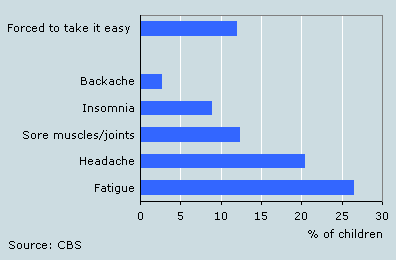One in five children suffer from chronic diseases

In the Netherlands, 1 in every 5 children aged between 4 and 12 are chronically ill. Asthma and chronic bronchitis are the most common chronic diseases. Approximately 5 percent of children have chronic behavioural and learning problems, such as dyslexia and attention-deficit hyperactivity disorder. Over one quarter of children suffer from chronic fatigue.
Asthma and chronic bronchitis most common
Chronic physical diseases like asthma and chronic bronchitis were found in 1 in every 10 children last year. Eczema is also relatively frequent. More than 1 in 6 children are diagnosed with eczema. Asthma and eczema often occur together. One quarter of eczema patients also have asthma.
Cancer is less frequent in children. Approximately 0.1 percent of children are diagnosed with cancer. Because juvenile cancer is rare, all cases are included in the survey, even if the patient has fully recovered more than one year ago.
Chronic diseases in 4 to 12-year-olds, 2001-2007

Chronic behavioural problems and learning disabilities mainly found in boys
Apart from chronic physical disorders, children may also suffer from chronic behavioural problems and learning disabilities. Dyslexia, i.e. difficulty with written language, in particular with reading and spelling, is found in 4 percent of children. Another 5 percent of children (boys more often than girls) are diagnosed for attention-deficit hyperactivity disorder (ADHD).
Dyslexia and ADHD in 4 to 12-year-olds, 2001-2007

Children are often tired
In the 14 days prior to the survey, 12 percent of children had to take it easy due to illness or injury; 31 percent were confined to bed rest.
More than 1 in 4 children were tired during the past fortnight and 1 in 5 children suffered from headaches. Nearly half of children with health complaints suffer from multiple disorders. Not surprisingly, 60 percent of children who suffer from insomnia are also tired. Vice versa, 20 percent of tired children suffer from insomnia.
Health-related problems in the fortnight prior to the survey in children aged between 4 and 12, 2001-2007

Marieke van Herten